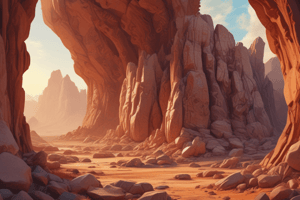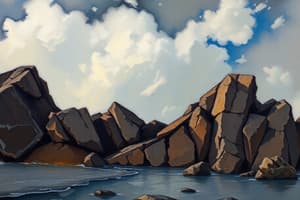Podcast
Questions and Answers
What are detrital sedimentary rocks made of?
What are detrital sedimentary rocks made of?
- Volcanic ash and lava
- Chemical precipitates
- Pieces of pre-existing rocks (correct)
- Organic remains
How does the composition of a detrital sedimentary rock change as the rock fragment travels farther from its mountain source?
How does the composition of a detrital sedimentary rock change as the rock fragment travels farther from its mountain source?
- It becomes more uniform
- It becomes larger in size
- It becomes less eroded
- It becomes more eroded and uniform in composition (correct)
How is the texture of a detrital sedimentary rock determined?
How is the texture of a detrital sedimentary rock determined?
- By the amount of organic matter present
- By its chemical composition
- By its grain size, sorting, and roundness (correct)
- By its color and luster
What is a depositional feature in a sedimentary rock?
What is a depositional feature in a sedimentary rock?
Why do geologists study the features preserved in sedimentary rocks?
Why do geologists study the features preserved in sedimentary rocks?
What happens to the large grains like cobbles and pebbles when the river exits the mountains?
What happens to the large grains like cobbles and pebbles when the river exits the mountains?
What is a defining characteristic of conglomerate and breccia sedimentary rocks?
What is a defining characteristic of conglomerate and breccia sedimentary rocks?
How do organic chemical rocks like limestone form?
How do organic chemical rocks like limestone form?
Under what conditions do inorganic chemical rocks form?
Under what conditions do inorganic chemical rocks form?
What is a characteristic feature of micritic limestone formed from inorganic processes?
What is a characteristic feature of micritic limestone formed from inorganic processes?
How do detrital or clastic sedimentary rocks form?
How do detrital or clastic sedimentary rocks form?
What is the key process involved in creating both detrital and chemical sedimentary rocks?
What is the key process involved in creating both detrital and chemical sedimentary rocks?
What role does compaction play in the formation of sedimentary rocks?
What role does compaction play in the formation of sedimentary rocks?
What happens as burial continues in the lithification process?
What happens as burial continues in the lithification process?
What is the name of the common process involved in forming most sedimentary rocks?
What is the name of the common process involved in forming most sedimentary rocks?
Study Notes
Detrital Sedimentary Rocks
- Detrital sedimentary rocks are made of fragments of pre-existing rocks that have been transported away from their source and deposited in a new location.
- As the rock fragments travel farther from their mountain source, the composition of the detrital sedimentary rock changes, with smaller grains and more rounded shapes indicating greater distance from the source.
Textures of Detrital Sedimentary Rocks
- The texture of a detrital sedimentary rock is determined by the size and shape of the rock fragments, as well as the amount of cement between them.
Depositional Features
- A depositional feature in a sedimentary rock is a characteristic that forms during or shortly after deposition, such as cross-bedding or graded bedding.
Importance of Sedimentary Rocks
- Geologists study the features preserved in sedimentary rocks to gain insights into the geological history of an area, including the environments and processes that operated in the past.
Detrital Sedimentary Rock Formation
- As a river exits the mountains, the large grains like cobbles and pebbles are deposited, while the smaller grains continue to be transported.
- Conglomerate and breccia sedimentary rocks are defined by their coarse-grained texture, with conglomerate having rounded grains and breccia having angular grains.
Chemical Sedimentary Rocks
- Organic chemical rocks like limestone form through the accumulation of calcium carbonate from organic sources, such as shell fragments or coral reefs.
- Inorganic chemical rocks form through chemical precipitation, such as when minerals precipitate out of solution in a hypersaline lake.
- Micritic limestone formed from inorganic processes is characterized by a fine-grained, microcrystalline texture.
Lithification Process
- Detrital or clastic sedimentary rocks form through the lithification process, which involves compaction, cementation, and other processes.
- The key process involved in creating both detrital and chemical sedimentary rocks is lithification, which transforms sediment into sedimentary rock.
- Compaction plays a crucial role in the formation of sedimentary rocks, as it squeezes out pore space and helps to bind the sediment grains together.
- As burial continues in the lithification process, the sediment becomes increasingly compacted and cemented, eventually forming a solid sedimentary rock.
- The common process involved in forming most sedimentary rocks is diagenesis, which includes all the changes that occur in sediment after deposition, from compaction to cementation.
Studying That Suits You
Use AI to generate personalized quizzes and flashcards to suit your learning preferences.
Description
Test your knowledge on the formation of detrital and chemical sedimentary rocks, their components, and the processes involved in their formation.




